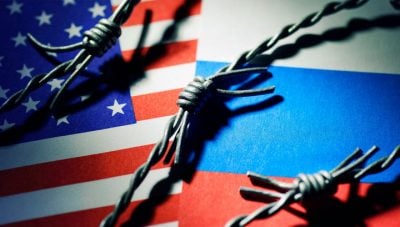The US Wants to Sanction Away Russia’s “Great Society”

Latest round of proposed US sanctions is intended to offset Putin’s legacy-defining socio-economic development program known as the “Great Society”
***
Congress is deliberating whether to promulgate the so-called “Defending American Security from Kremlin Aggression Act of 2019” (DASKAA) that would impose a new round of sanctions against Russia’s financial, shipbuilding, and LNG industries. The timing of this bill shouldn’t be seen as coincidental either, nor should its targeted industries, because it’s part of the US’ strategy to offset President Putin’s legacy-defining socio-economic development program known as the “Great Society”. The Russian leader promised during his reelection campaign last year to prioritize state investment in the economy with a view to making the country competitive with its fellow Great Power peers, and he finally released details about his plans for implementing this grand vision last month.
According to reports, the “Great Society” will cost upwards of $390 billion and focus on 12 main spheres of development including agriculture, transportation infrastructure, and the digital economy, among others. Russia is able to afford this after unveiling its state-of-the-art hypersonic weaponry last year and proving that the country no longer needs to invest such large sums into the military-industrial complex in order to safeguard the state’s security. As such, budgetary funds will naturally be rerouted to the “Great Society”, provided of course that Russia is able to avoid playing into the US’ hands and entering into a costly interconnected arms and space race, which it has thus far been able to resist. It’s precisely because of that, however, that sanctions are once again being weaponized to subvert the “Great Society”.
It’s worthwhile to analyze the specific sectors that DASKAA intends to target in order to obtain a greater appreciation of the strategic deviousness behind this plan. Prohibiting any dealings with Russian state debt and “bonds issued by the Central Bank, the National Wealth Fund, or the Federal Treasury of the Russian Federation, or agents or affiliates of any of these entities” might not seem like that big of a deal at first because it only applies to American citizens, but the danger arises if the US decides to extra-judicially expand its authority to selectively impose so-called “secondary sanctions” against non-Americans who violate this legislation. That could have a chilling effect by deterring some Europeans from engaging in this industry and therefore dealing a hit to the Kremlin’s coffers.
Not only that, but it’s noteworthy that there are provisions included in the text for supposedly targeting Russian banks and other financial entities that the US accuses of being involved in what it alleges to be Moscow’s meddling abroad. This is nothing more than a pretext for selectively sanctioning various entities at will and holding that Damocles’ sword above Russia’s head at all times. Again, the effect is the same, and it’s to dissuade others from doing business with these important actors of the Russian economy. Similarly, the restrictions that are suggested for the shipbuilding and LNG industries are motivated by the desire to simultaneously undercut the US’ competitors, deprive Russia of extra revenue, and impede its non-Western diversification strategy.
About the latter, Russia has been “rebalancing” its strategic focus eastward towards the “Global South” ever since the initial imposition of sanctions against it in early 2014, with energy sales and shipping expected to become some of the vanguard industries of this pivot. Imposing sanctions against those two are supposed to cripple them and trigger cascading consequences that ultimately culminate in putting the brakes on this rapid “rebalancing” and subsequently hitting the state’s budget where it hurts at its most vulnerable time of systemic transition throughout the course of the “Great Society’s” gradual implementation. Acknowledging the risks that DASKAA could pose for Russia, it can be confidently predicted that the worst-case scenarios probably won’t transpire.
Germany’s continued cooperation with Russia on Nord Stream II despite the US’ sanctions threats proves that independently minded Great Powers are capable of defying America’s demands and pursuing their own self-interests as they relate to Russia, suggesting that Berlin might also be incentivized to ignore the US’ DASKAA sanctions threats as well. If the EU’s leader sets the example, then some of its other member states might follow, which could also send a powerful political message to the US. In addition, other non-Western Great Powers such as China, India, Turkey, Saudi Arabia, and possibly even Japan might also be undeterred and contrarily double down on their commitment to doing business with Russia in those sectors.
The Russian leadership must have anticipated that the weaponization of sanctions would predictably follow the US’ expected failure to trick the country into a costly interconnected arms and space race to offset the “Great Society”, so it should be understood that the state was already prepared for all contingencies and also wouldn’t have made the far-reaching commitments that it did had it not had a reliable means to pay for it. In fact, President Putin announced late last month that Russia’s reserves cover all of the country’s foreign and domestic debt for the first time ever, which is places it in an excellent position to fund its ambitious socio-economic development program across the next six years. As such, there’s no reason to fear that DASKAA will succeed, but it also shouldn’t be completely dismissed either.
*
Note to readers: please click the share buttons below. Forward this article to your email lists. Crosspost on your blog site, internet forums. etc.
This article was originally published on InfoRos.
Andrew Korybko is an American Moscow-based political analyst specializing in the relationship between the US strategy in Afro-Eurasia, China’s One Belt One Road global vision of New Silk Road connectivity, and Hybrid Warfare. He is a frequent contributor to Global Research.
Featured image is from InfoRos

